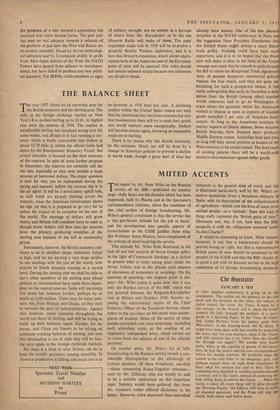MUTED ACCENTS
THE report by Mr. Peter Wiles on the Russian service of the BBC—published on another page—fully bears out the disquiet which has been expressed, both by Pharos and in the Spectator's correspondence columns, about the condition of this vital section of foreign broadcasting. Mr. Wiles's general conclusion is that the service has a 'too pro-Soviet attitude for the job in hand,' and his investigation into specific aspects of transmissions to the USSR justifies those who, like Professor Seton-Watson, have complained of the attitude of mind inspiring the service.
This attitude Mr. Wiles finds illustrated in the lack of any real analysis of Soviet foreign policy in the light of Communist ideology; in a failure to present what is really taking place inside the Soviet Union; and in the almost total absence of discussion of economics or sociology. On the question of jamming—the original point in dis- pute—Mr. Wiles makes it quite clear that it was only the Russian service of the BBC which was not jammed between the Bulganin-Khrushchev visit to Britain and October, 1956, thereby ex- posing the controversial tactics of the Chief Publicity Officer of the European Service, whose letters to the Spectator on this point were master- pieces of evasion. Some of the tactics of other people concerned, too, were surprising—including such schoolboy tricks as the sending of an apparently independent letter, which turned out to come from the address of one of the officials involved.
On another point, Mr, Wiles's list of. MPs broadcasting in the Russian service reveals a con- siderable disproportion to the advantage of Labour speakers. Of these broadcasts, one-fifth —those concerning Russo-Yugoslav relations— were by Mr. Zilliacus, who can hardly be said to be a suitable spokesman on this important topic. Nobody would have gathered this from Mr. Gretton's rather offhand disclaimer in his letters, However, more important than individual instances is the general state of mind, and this is illustrated particularly well by Mr. Wiles's ex tensive quotations from a broadcast obituary of Stalin with its description of the collectivisation of agriculture—which cost the lives of some three million people—as a 'mistake.' Does this kind of thing really represent the 'British point of view'? Obviously not; but, if not, how does the BBC reconcile it with the obligations assumed under its own Charter?
It would be interesting to know. What matters, however, is not that a bureaucracy should be proved wrong or right, but that a representative British point of view should be presented to the _ peoples of the USSR and that the BBC should do as good a job with its Russian service as the high reputation of its foreign broadcasting demands.










































 Previous page
Previous page